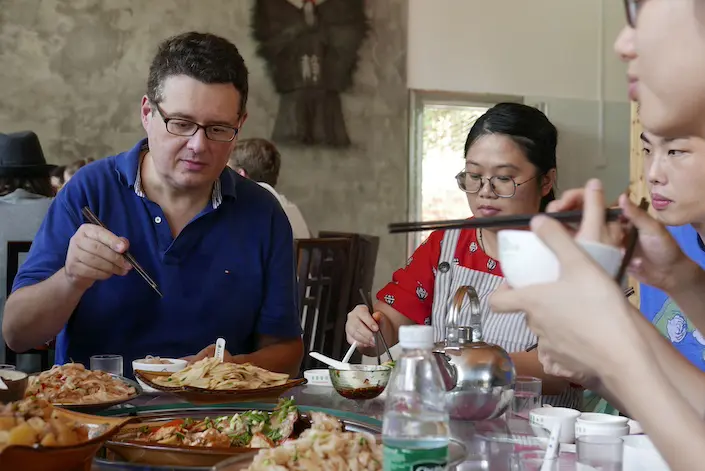Top 10 Tips For Bargaining Etiquette When Shopping In China
1. Start low, but be RespectfulTip Offer 50-70% less than the quoted price and negotiate upwards. Keep your tone polite but firm to show you're serious.Pro: Makes it easier to establish your position without offending seller.Con: A low starting price can be a source of frustration for sellers, particularly for items with a lower margin.
2. Find out the market valueMake sure you don't overpay by researching the cost of an item before buying.Pro It gives you confidence to negotiate and avoid being swindled.Con: It is time-consuming to research, particularly when it comes to unique handmade items.
3. Show Genuine InterestTip. Sellers will bargain with you if they think that you're serious about purchasing.Pro: Develops trust and increases the chances of getting a great deal.Pro: Your excessive enthusiasm may be seen as a sign of a willingness or desire to pay more. This can reduce your credibility.
4. You are able to walk away with a strategic planTips: Take your time walking away in case the price doesn't fall. Sellers might contact you with a better deal.Pro: This strategy can be effective in getting the lowest prices.The downside is that it can be counterproductive when the seller is unable to reduce the cost of a product, especially when it's highly sought-after.
5. Learn Basic Mandarin PhrasesTip: Phrases like "Tai gui le!" (Too expensive!) "Pianyi Yadian Ba" (Can it be cheaper?) The effort is needed.Pro: Personalizes negotiations and eases the seller's position.Cons: The use of limited phrases may not be useful in more complex negotiations.
6. Be patient and remain calmNegotiations could take a long time. Do not appear anxious by retaining a calm attitude.Pro: Sellers will often give better deals to buyers who remain calm and persistent.Con: It requires time and energy, especially in markets that are crowded.
7. Bring CashCash payments are often preferential by merchants over digital payment methods.Pro: Cash offers made immediately can result in discounts, particularly for small-sized sellers.Con: Carrying cash in places that are crowded is risky because of pickpockets.
8. Group DiscountsGet discounts in bulk when you purchase several items.Pro: You can boost your bargaining skills and score more bargaining power and a better price.Pro: It requires you to buy additional items that may not fit your needs.
9. Do not be afraid to say NoTip: If the seller won't reduce the price, respectfully turn down the offer and leave.Pro: You can avoid the guilt of a buyer and remain within the budget.The downside is that you could be unable to get an item you've always wanted.
10. You Should Never BargainDon't bargain at department stores or high-priced boutiques.Pro Keeps cultural sensitivity in check and avoids embarrassment.Limits to your negotiation options in specific settings
Benefits of Bargaining in ChinaNegotiating the cost can be a great option to reduce costs.Cultural Experience: Bargaining offers an opportunity to learn about local customs and traditions.Personal Interaction: Creates an interaction with local vendors.The disadvantages of bartering with ChineseThe process can take a long time, particularly for those who are new to the game.If you do not have the basic Mandarin the communication could be difficult.The process of bargaining is stressful for some people.Learning these techniques will enable you to negotiate with confidence on Chinese markets. View the most popular explore local Chinese cuisine for website info including culinary tours of China best cities, China culinary hotspots, savor China regional food specialties, the best food destinations in China, Chinese food culture guide, authentic Chinese culinary adventures, China flavorful food culture, explore China riCh food history, explore local Chinese cuisine, discover hidden food gems in China and more.

Top 10 Tips For Dining Etiquette, Manners And Dress In China
1. Wait to be Seated Tip: When dining in formal settings, you should wait until the host or your server leads you to a seating area. The seating arrangement are a reflection of hierarchies.Pro: You must respect cultural norms as well as the authority of your host.Con: When in casual settings, you may not know who is the host, which can cause confusion.
2. Chopsticks: How to Use Them CorrectlyIf it appears you're performing a funeral ritual, avoid sticking your chopsticks straight into the rice. When not in use you can place them on the chopstick holder and/or place them flat on a plate or bowl.Pro: Prevents any inadvertent disrespect.Con: Learning proper chopstick etiquette might take practice for beginners.
3. Respect for the EldersAs a suggestion, let the senior or oldest person begin eating first. The meals are typically served first.Pro: Remains true to family values and traditional social hierarchy.Pros: This tradition is often a source of confusion or even unwelcome in casual environments.
4. Share DishesChinese dining is communal. Food items will be set in the centre for all to enjoy. You should only take the last item if it is offered.Pro: It creates a sense that there is a community and a shared experience.Con: If you're a person with a limited taste, sharing food could make it difficult for you.
5. Avoid Wasting FoodTip: Make sure you consume as much food as you can consume. The food you leave on the table could be considered disrespectful or wasteful.Pro: Shows appreciation for the host's efforts.Con: Overestimating your appetite can leave you struggling to finish.
6. Toast ProperlyYou can be respectful by lowering your glasses slightly lower than those of respected or older people.Pro: Demonstrates politeness.Cons: It can be difficult to remember multiple toasts when you are in a crowd of many people.
7. Don't throw fish away!Tip A word of caution: In south China flipping a fish after eating the other side is considered bad luck. This is a sign of the capsized ship.Pro: Refrains from the offending regional superstitionsContra: This custom could not be applicable in northern China which could lead to different practices.
8. Slurping and Burping is OKSlurping noodles or soup isn't considered rude. It's a sign you're having fun. Burping is sometimes tolerated by cooks as a mark of gratitude.Pro: It makes you to relax and enjoy your meal.Cons: This may conflict with cultural norms and make you feel uncomfortable.
9. Chopsticks are not to be used as a point reference.Chopsticks should only be used to eat with. Use chopsticks only to eat.Pro: Provides a friendly dining experience.Con: It’s easy to overlook this rule in an engaging discussion.
10. The Bill Payment Process: Who's Responsible?In China hosts typically insist on paying for meals. You can offer, but you might be met with resistance.Pro: Expresses gratitude to the generosity of your host.Cons: Insisting too much could look unsincere and unprofessional.
There are numerous benefits to following dining etiquette in ChinaCultural Respect: Adhering to the customs of your local community promotes goodwill.Social Bonding: The practice of observing traditions creates a sense of belonging and gratitude.Avoids Missteps: Proper etiquette helps you navigate unfamiliar dining situations smoothly.A true experience: Taking part in traditional customs will enhance your experience.Pros of Following Dining Etiquette In ChinaComplex Rules: For people who are new to the area, the sheer number of rules and regulations can be overwhelming.Regional Variations: Etiquette norms can differ between regions, causing potential confusion.Formalities could delay your meal.Hand gestures that aren't familiar: Certain techniques, like using chopsticks in a proper manner, require effort.You can master Chinese dining etiquette effortlessly by following these suggestions. This will ensure a pleasant and respectful experience for you and your guests. Read the most popular tasty delights from China for site recommendations including tasty delights from China, Chinese food culture guide, a deep dive into China food culture, Chinese food you must try, explore China riCh food history, a culinary journey through China, China famous food destinations, explore diverse Chinese dishes, discover hidden food gems in China, explore the best local eats in China and more.

Comments on “20 Top Reasons To Uncover China Food Traditions”